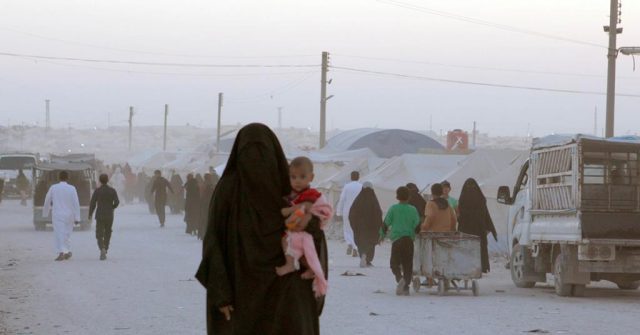
Sabaya tells the story of brutalized Yazidi women at the hands of Daesh in a Syrian camp
SABAYA (Hogir Hirori, 2021)
Film Forum
209 West Houston St.
Opens Friday, July 30
212-727-8110
filmforum.org
www.sabayathefilm.com
“What must be done so a woman will not be a victim of war?” twenty-one-year-old human rights activist Nadia Murad, a member of the Yazidi religious minority, asks in Alexandria Bombach’s award-winning 2018 documentary, On Her Shoulders. Murad’s question is not rhetorical; she was brutalized as a sex slave herself when Daesh (ISIS) attacked the Yazidi, followers of a small, ancient monotheistic religion. Swedish-Kurdish filmmaker Hogir Hirori explores the horrors further in the real-life thriller Sabaya, which opens July 30 at Film Forum.
On August 3, 2014, Daesh stormed Yazidi villages in Sinjar province in northern Iraq, murdering men, women, and children while also kidnapping thousands of girls and young women, who were beaten, raped, and forced to convert to Islam. The abused women are known as sabaya, or sex slaves, who serve multiple terrorist husbands and have their babies. Over eighteen months, Hirori made six visits to Syria, embedding himself with a handful of volunteers from the Yazidi Home Center as they attempt to rescue sabaya, one at a time.
Armed with a cellphone and a gun, Mahmud, Ziyad, and a few others make dangerous sojourns at night into the Al-Hol camp in Syria, where more than seventy-three thousand Daesh live, guarded by Kurdish troops. Mahmud and Ziyad track down specific girls and young women using information from their family and female infiltrators who have been placed on the inside, risking their own lives to save these sabaya. At one point, Mahmud goes into Hassake Prison, where fifteen thousand Daesh captives are piled into rooms, as he searches out someone who will talk.
When Mahmud and Ziyad succeed, they drive the women back to the center, a ramshackle structure in a deserted area where Mahmud’s wife, Siham, and mother, Zahra, try to help the traumatized women adjust and eventually reunite them with their loved ones who, if they’re still alive, are ready to welcome them back with open arms, a refreshing difference from other religions in which they are more likely to be murdered in an honor killing or shunned from society. These sabaya are often engulfed in shame and sometimes suicidal, preferring death to a life haunted by the memories of their experiences.
“You are safe now. No one is going to hurt you,” Zahra tells a newly freed Leila, who shares her story, tears in her eyes. “We were happy in our previous lives,” Leila says. “Even though we were poor, we were happy. Then they came and killed all the men. They took us women to the city of Mosul. I can’t . . . take any more.” Meanwhile, Mahmud and Siham’s young son, Suleyman, plays, smiles, and laughs, unwittingly bringing hope and joy to the women.
Winner of the Directing Award for World Cinema Documentary at Sundance, Hirori (The Deminer) directed, edited, and photographed the film, mostly working alone or with one assistant, venturing into harm’s way as Mahmud and Ziyad head into the darkness and are shot at and threatened, undeterred from their mission to bring back as many of the missing sabaya, numbering more than two thousand, some as young as seven, as they can. Sabaya is a powerful, gripping reminder of what is happening to women and religious minorities around the world every day, and that there are quiet, unrecognized heroes like Mahmud toiling away in the shadows as well as public advocates like Murad, risking their own safety to do something about it. It’s also a harrowing chronicle of the innate cruelty of too much of humanity.